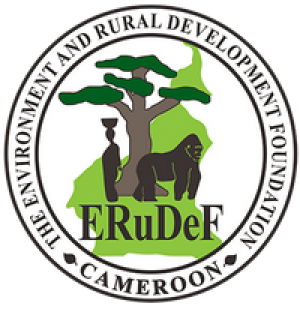Over 4000 seeds of Mahogany (Entandrophragma angolensis), have been collected to make up the fourth layer of ERuDeF’s agroforestry Forest Garden practice in Cameroon.
The seeds were collected recently by ERuDeF’s Southwest Agroforestry Coordinator, Adeline Tengem, during a field visit to the Mt. Cameroon area.
According to the Agroforestry specialist, the choice of the tree was due to the quality of its timber, broad leaves necessary for water catchment protection and its medicinal value.
“Mahogany is a tree species highly cherished for timber due to its durability and workability. The wood, usually traded as ‘tiama’, is highly valued for furniture, cabinet work, and plywood, and is also used for flooring, paneling, stairs, ship building, vehicle bodies and coffins” Tengem added.
According to her research on this tree, it is suitable for light construction, musical instruments, toys, novelties, boxes, crates, carvings and turnery.
“The parts that are not suitable for timber are used as firewood and for quality charcoal production. The bark extract is drunk against fever and stomach-ache. The leaves have large surface area qualifying mahogany for water catchment protection and it is also due to this quality that mahogany is planted as a shade tree in banana, coffee and tea plantations,” she intimated.
The mahogany seeds will be distributed to farmers in the Northwest, Southwest, West and Littoral Regions of Cameroon.
ERuDeF plans to establish complete forest garden in farmers’ fields for crop diversification. According to the President and Chief Executive Officer of ERuDeF, Louis Nkembi, a forest garden is complete when it has all 4 layers of plant species; food, vegetable, and agro-forestry crops, species of fruits, species of Non-Timber Forest Products (NTFPs), medicinal, and timber species.
The Director of the Department of Agroforestry and Agricultural Development (DAgfAD) at ERuDeF, Payong Marquise, explained that moving into the fourth level of crop diversification is a remarkable achievement for the department.
“Since we started the initiative of forest garden for crop diversification and income sustainability of farmers, we have never reached the fourth level. Having access to timber species for the said level has always been a hindrance to us. Thus, the trip was so necessary at this time of the year that we envisage moving to another level as far as this department and projects are concern. Forest garden is just one out of many practices of agro-forestry carried out in farms for the purpose of securing food and improving incomes of resource poor farmers in Cameroon,” Payong added.
The quality of mahogany has warranted wanton indiscriminate logging and destruction of habitats (for agriculture) by the local population which has rendered the tree endangered by the International Union of Conservation of Nature (IUCN).Thus, including it in farmers’ forest gardens distracts the present and future generations of humankind from logging and the destruction of Protected areas since they will have to harvest from their gardens.
The 4000 seeds will be nursed in 4 regions of Cameroon including Northwest, Southwest, Littoral, and West regions to be planted in farmers’ fields around the Bamenda Highlands, Mt. Cameroon/Kupe Muanenguba, Mt. Nlonako and Mt. Bamboutos respectively upon intensive training.
Agroforestry is a project of the Environment and Rural development Foundation (ERuDeF) in collaboration with US based Trees for The Future.
It is aimed at addressing the urgent food insecurity problems in Cameroon. It works with farmers and field-based technicians all over 4 regions of Cameroon.
By Wokwan Tegem
